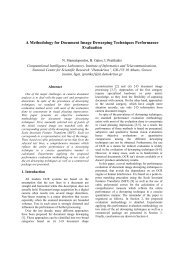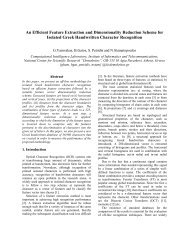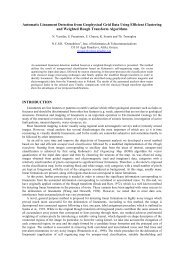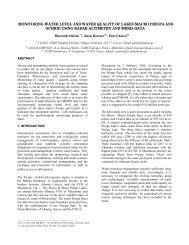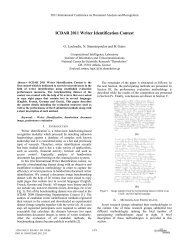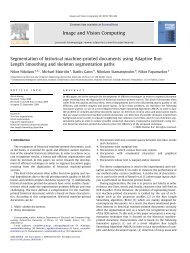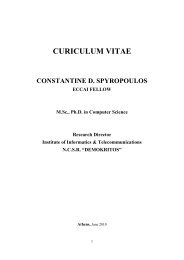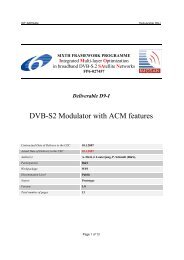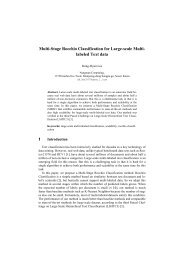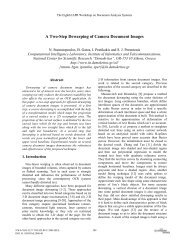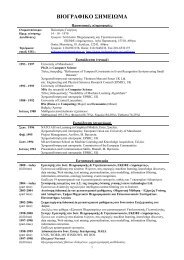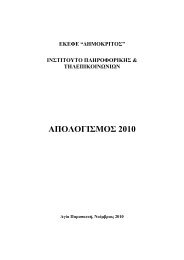TMS320C6713B Floating-Point Digital Signal Processor (Rev. A)
TMS320C6713B Floating-Point Digital Signal Processor (Rev. A)
TMS320C6713B Floating-Point Digital Signal Processor (Rev. A)
Create successful ePaper yourself
Turn your PDF publications into a flip-book with our unique Google optimized e-Paper software.
SPRS294A − OCTOBER 2005 − REVISED NOVEMBER 2005<br />
description<br />
The TMS320C67x DSPs (including the <strong>TMS320C6713B</strong> device † ) compose the floating-point DSP generation<br />
in the TMS320C6000 DSP platform. The C6713B device is based on the high-performance, advanced<br />
very-long-instruction-word (VLIW) architecture developed by Texas Instruments (TI), making this DSP an<br />
excellent choice for multichannel and multifunction applications.<br />
Operating at 225 MHz, the C6713B delivers up to 1350 million floating-point operations per second (MFLOPS),<br />
1800 million instructions per second (MIPS), and with dual fixed-/floating-point multipliers up to 450 million<br />
multiply-accumulate operations per second (MMACS).<br />
Operating at 300 MHz, the C6713B delivers up to 1800 million floating-point operations per second (MFLOPS),<br />
2400 million instructions per second (MIPS), and with dual fixed-/floating-point multipliers up to 600 million<br />
multiply-accumulate operations per second (MMACS).<br />
The C6713B uses a two-level cache-based architecture and has a powerful and diverse set of peripherals. The<br />
Level 1 program cache (L1P) is a 4K-byte direct-mapped cache and the Level 1 data cache (L1D) is a 4K-byte<br />
2-way set-associative cache. The Level 2 memory/cache (L2) consists of a 256K-byte memory space that is<br />
shared between program and data space. 64K bytes of the 256K bytes in L2 memory can be configured as<br />
mapped memory, cache, or combinations of the two. The remaining 192K bytes in L2 serves as mapped SRAM.<br />
The C6713B has a rich peripheral set that includes two Multichannel Audio Serial Ports (McASPs), two<br />
Multichannel Buffered Serial Ports (McBSPs), two Inter-Integrated Circuit (I2C) buses, one dedicated<br />
General-Purpose Input/Output (GPIO) module, two general-purpose timers, a host-port interface (HPI), and a<br />
glueless external memory interface (EMIF) capable of interfacing to SDRAM, SBSRAM, and asynchronous<br />
peripherals.<br />
The two McASP interface modules each support one transmit and one receive clock zone. Each of the McASP<br />
has eight serial data pins which can be individually allocated to any of the two zones. The serial port supports<br />
time-division multiplexing on each pin from 2 to 32 time slots. The C6713B has sufficient bandwidth to support<br />
all 16 serial data pins transmitting a 192 kHz stereo signal. Serial data in each zone may be transmitted and<br />
received on multiple serial data pins simultaneously and formatted in a multitude of variations on the Philips<br />
Inter-IC Sound (I2S) format.<br />
In addition, the McASP transmitter may be programmed to output multiple S/PDIF, IEC60958, AES-3, CP-430<br />
encoded data channels simultaneously, with a single RAM containing the full implementation of user data and<br />
channel status fields.<br />
The McASP also provides extensive error-checking and recovery features, such as the bad clock detection<br />
circuit for each high-frequency master clock which verifies that the master clock is within a programmed<br />
frequency range.<br />
The two I2C ports on the <strong>TMS320C6713B</strong> allow the DSP to easily control peripheral devices and communicate<br />
with a host processor. In addition, the standard multichannel buffered serial port (McBSP) may be used to<br />
communicate with serial peripheral interface (SPI) mode peripheral devices.<br />
The <strong>TMS320C6713B</strong> device has two bootmodes: from the HPI or from external asynchronous ROM. For more<br />
detailed information, see the bootmode section of this data sheet.<br />
The TMS320C67x DSP generation is supported by the TI eXpressDSP set of industry benchmark<br />
development tools, including a highly optimizing C/C++ Compiler, the Code Composer Studio Integrated<br />
Development Environment (IDE), JTAG-based emulation and real-time debugging, and the DSP/BIOS<br />
kernel.<br />
TMS320C6000, eXpressDSP, Code Composer Studio, and DSP/BIOS are trademarks of Texas Instruments.<br />
† Throughout the remainder of this document, <strong>TMS320C6713B</strong> shall be referred to as C6713B or 13B.<br />
POST OFFICE BOX 1443 • HOUSTON, TEXAS 77251−1443<br />
11



